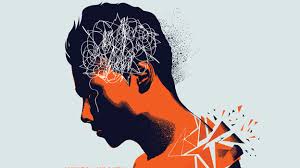Navigating the Depths: Understanding Depression in Today’s Society
by twib

The Impact of Depression on Mental Health
Depression is a common mental health disorder that affects millions of people worldwide. It goes beyond feeling sad or going through a rough patch; it is a serious condition that can impact all aspects of a person’s life.
Recognizing the Signs
It’s essential to recognise the signs of depression early on to seek help and support. Symptoms may include persistent feelings of sadness, hopelessness, loss of interest in activities once enjoyed, changes in appetite or weight, difficulty sleeping or oversleeping, fatigue, and thoughts of self-harm or suicide.
The Importance of Seeking Help
Seeking help for depression is crucial. It’s not a sign of weakness but a proactive step towards better mental well-being. Professional support from therapists, counsellors, or psychiatrists can provide effective treatment options such as therapy, medication, or a combination of both.
Breaking the Stigma
One of the biggest challenges in addressing depression is overcoming the stigma associated with mental health issues. It’s vital to promote open conversations about mental health and create supportive environments where individuals feel safe to seek help without fear of judgment.
Self-Care and Coping Strategies
In addition to professional help, self-care practices play a significant role in managing depression. Engaging in regular physical activity, maintaining a balanced diet, getting enough sleep, practising mindfulness or meditation, and connecting with supportive relationships can all contribute to improved mental well-being.
Conclusion
Depression is a complex and challenging condition that requires understanding and compassion. By raising awareness, promoting acceptance, and providing access to resources and support systems, we can create a more empathetic society where individuals struggling with depression feel empowered to seek help and embark on a journey towards healing.
Understanding Depression: Causes, Mechanisms, and Definitions
- What is the primary cause of depression?
- What exactly happens in depression?
- What is the definition of a depression?
- What leads depression in a person?
What is the primary cause of depression?
The primary cause of depression is multifaceted and varies from person to person. While there is no single definitive cause, factors such as genetics, brain chemistry, life experiences, and environment can all play a role in the development of depression. Some individuals may have a genetic predisposition to depression, while others may experience depressive symptoms triggered by stressful life events or trauma. It’s important to understand that depression is a complex mental health condition influenced by a combination of biological, psychological, and social factors that interact differently for each individual. Seeking professional help and support is essential in addressing and managing depression effectively.
What exactly happens in depression?
In depression, a complex interplay of biological, psychological, and environmental factors unfolds, impacting an individual’s mental and emotional well-being. Neurotransmitter imbalances, particularly involving serotonin and dopamine, can disrupt communication pathways in the brain, affecting mood regulation. Additionally, genetic predispositions and life experiences can contribute to the onset and severity of depressive symptoms. Emotionally, individuals may experience persistent feelings of sadness, hopelessness, or numbness, while cognitively they may struggle with negative thought patterns and difficulty concentrating. Socially, depression can lead to social withdrawal and strained relationships. Understanding these multifaceted aspects of depression is crucial in providing effective support and treatment for those affected by this mental health condition.
What is the definition of a depression?
Depression is a mental health condition characterised by persistent feelings of sadness, hopelessness, and a loss of interest in activities once enjoyed. It goes beyond temporary mood fluctuations and can significantly impact a person’s daily life, relationships, and overall well-being. Individuals experiencing depression may also exhibit symptoms such as changes in appetite or weight, sleep disturbances, fatigue, and thoughts of self-harm or suicide. Seeking professional help and support is essential for managing depression effectively and promoting mental wellness.
What leads depression in a person?
Depression can be caused by a combination of genetic, biological, environmental, and psychological factors. While the exact causes of depression may vary from person to person, some common triggers include a family history of mental health disorders, imbalances in brain chemicals like serotonin and dopamine, traumatic life events such as loss or abuse, chronic stress, certain medical conditions, and substance abuse. It’s important to recognise that depression is a complex condition with multifaceted origins, and seeking professional help to understand individual risk factors and triggers is crucial in effectively managing and treating the condition.
Understanding Depression The Impact of Depression on Mental Health Depression is a common mental health disorder that affects millions of people worldwide. It goes beyond feeling sad or going through a rough patch; it is a serious condition that can impact all aspects of a person’s life. Recognizing the Signs It’s essential to recognise the…
Latest articles
- Unveiling the Impact: The Crucial Role of Epidemiology in Public Health
- Navigating the Troubles of a Middle Ear Infection: Understanding Symptoms and Treatment Options
- Stay Informed with the Latest EPL News Updates
- Tackling the Challenges of Tuberculosis (TB): A Global Health Perspective
- Exciting EPL Results Today: Thrilling Matches Unfold in Premier League Showdown
